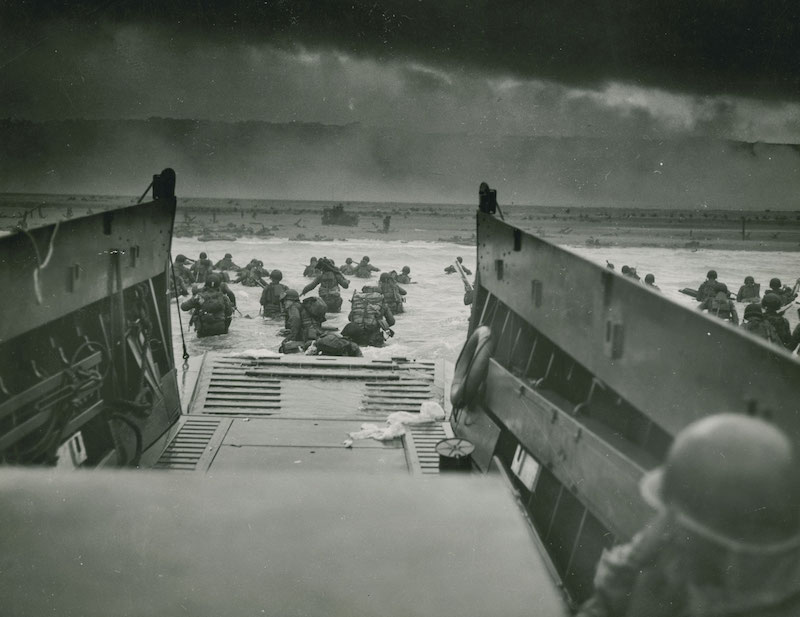
May/June 2024 (Volume 16, Issue 3)
By Michael Swanger
The world that we inhabit today is largely defined by the most significant event of the 20th century, World War II, which is why some historians consider June 6, 1944, D-Day, the most important day of the 20th century.
Therefore, as we approach the 80th anniversary of D-Day, the Allied invasion of Normandy to liberate France and Western Europe from Nazi Germany occupation, we should acknowledge the significance of that historic day. We should also remember the 156,115 Allied troops who engaged in the largest seaborne invasion in history, including the Iowans among them, as it would pave the path for an Allied victory on the Western Front and the eventual surrender of Germany on May 8, 1945.
Operation Overlord, commonly referred to as D-Day, marked the beginning of the end of World War II. The war, which lasted from 1939 to 1945, was the deadliest conflict in human history claiming an estimated 70 million to 85 million lives. It also shaped the world in every conceivable way geographically, politically, economically, militarily, morally, and spurred rapid advancements in industrialization, transportation, scientific capabilities and weaponry.

U.S. troops wade ashore on Omaha Beach, June 6, 1944. The original cutline for this iconic U.S. Coast Guard image read “INTO THE JAWS OF DEATH.”
“You are about to embark upon the Great Crusade, toward which we have striven these many months. The eyes of the world are upon you,” U.S. Gen. Dwight D. Eisenhower told Allied troops on the eve of D-Day.
In spite of Ike’s pep talk, little did the brave men who waded ashore Normandy’s beaches codenamed Utah, Omaha, Gold, Juno and Sword during the early hours of June 6, 1944, know that their gut-wrenching efforts and sacrifices would shape the outcome of the war, let alone the world in which their descendants would inherit. Instead, they were preoccupied with the sobering reality of avoiding barbed wire, wooden stakes and land mines while facing heavy fire from German gun emplacements overlooking the beaches. Many would see their friends gunned down in the surf and on the beaches like sitting ducks before miraculously reaching the shielding safety of Normandy’s cliffs.
“They had us pinned down,” the late Jubilee native Verle Buck told Iowa Public Television in 2006 for its documentary, “Iowa’s WWII Stories.” “We couldn’t get out of there. You’d stick your helmet above; they’d shoot a hole through it. It was hectic. It wasn’t orderly. It was too many of the leaders got shot up, killed and wounded.”
Codenamed Operation Neptune, preparation for D-Day began in 1943. But not everything went according to plan.
For starters, the invasion was delayed for 24 hours due to bad weather. Additionally, bombers failed to destroy enemy artillery bunkers; paratroopers were blown off course and easily killed by enemy snipers; and stormy seas accounted for sea-sick troops and rough landings that were off course while several amphibious tanks were sunk.
U.S. troops faced the heaviest resistance at Omaha Beach, suffering about 2,400 casualties on June 6, 1944. By the end of what must have felt like the longest day, the Allies incurred 4,414 casualties and an estimated 4,000 to 9,000 Nazi troops were killed. Of the 8,398 Iowans who died during World War II, 180 of them are buried in the American Cemetery at Normandy.
One week later, all five beaches were secured and linked. The Allies had gained a hard-fought foothold in France as more than 326,000 troops, 50,000 vehicles and 100,000 tons of equipment were unloaded on the beaches at Normandy. It would become a crucial supply line as the Allies fought their way across France — hedgerow by hedgerow — before liberating it two months later. They would continue their march into Germany where they faced fierce resistance from remaining radicalized Nazis, both young and old. None of it would have been possible were it not for the gallant efforts of the troops who stormed the beaches of Normandy on D-Day.
“They fight not for the lust of conquest. They fight to end conquest,” said President Franklin D. Roosevelt during his official address announcing the D-Day invasion. “They fight to liberate.”
TO READ MORE FASCINATING STORIES ABOUT IOWA HISTORY, subscribe to Iowa History Journal. You can also purchase back issues at the store.
